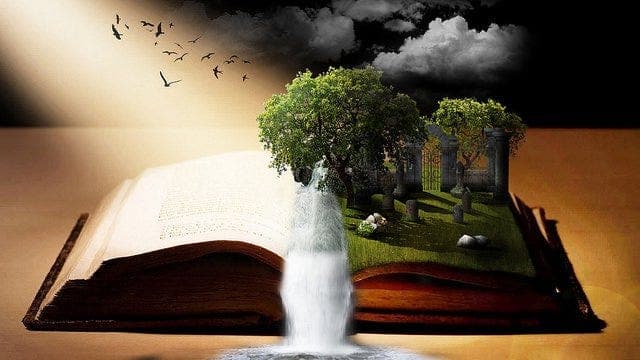Fiction has a unique ability — to open up new realities for the reader. Whether it’s the magical land of Narnia, the grim London of the 19th century, or a fictional village on the banks of the Danube — literature creates spaces in which we mentally reside. It’s not just a set of words on a page. It is the work of human imagination directed toward building worlds that sometimes feel more real than our surrounding reality.
The Power of Words: The Foundation of Literary Worlds
Every writer begins with emptiness — a blank sheet of paper or a clear screen. But from the very first lines, the reader enters a defined space: be it a street in Budapest brought to life in a Hungarian novel or a distant fantasy planet conjured by the author. Everything revolves around the word. A description of a city, the scent of spring air, the inner state of a character — each of these elements builds context, allowing the reader to feel part of the literary world.
This space doesn’t need to be richly detailed. Skilled writers can convey atmosphere with just a few strokes: a gust of wind, a trembling cold hand, the faint light of a lamp in the corner — and suddenly, a complete scene unfolds before the reader’s eyes.
Imagination as the Engine of Narrative
Reading fiction is always an act of co-creation. The author offers images, but it is the reader who fills them with the colors of their own perception. In this sense, literary imagination doesn’t belong solely to the writer. It arises in dialogue: between the text and the mind, between the lines and emotions. The same novel can be perceived differently by different people — and that is its infinite power.
Imagination in literature doesn’t just paint pictures. It helps expand the boundaries of perception, to peer into other eras, cultures, and mindsets. For example, Hungarian classics can open the door to rural life of the last century, to the everyday lives of villages and inner dramas familiar to anyone who grew up along the Tisza or Balaton. Through literary imagination, we don’t just observe — we live through the stories.
Literature as a Way of Experiencing Another’s Life
One of fiction’s most important qualities is its ability to immerse us in the lives of others. Through literary worlds, readers can live hundreds of lives, take on roles unavailable to them in reality. Through a character, one can feel anger, despair, love, euphoria. This experience is built not only on plot twists, but on deep emotional engagement.
Modern Hungarian authors increasingly turn to the personal, the intimate, often painful experience. This allows not just to follow the events but to immerse oneself in complex moral and psychological conflicts. Thus, literature becomes not only a form of aesthetic enjoyment but also a means of self-discovery.
Literary Worlds and Cultural Identity
Fictional worlds always carry the imprint of the culture from which they emerge. Hungary, with its multilayered history, is fertile ground for the creation of vivid, saturated literary spaces. Bródy, Esterházy, Kertész, and other writers didn’t just tell stories — they built whole coordinate systems that reflected fears and hopes, traits of the national character, the pain of loss, and the search for meaning.
This is especially important in the light of globalization. As cultural boundaries become increasingly blurred, literature helps preserve the sense of a “native” world — with its streets, smells, and tones. In this sense, literary imagination works as a cultural code passed from generation to generation.
The Evolution of Imagined Worlds: From Realism to Fantasy
A world created by an author doesn’t necessarily have to obey the laws of physics. With the development of genres, literature has increasingly moved away from strict imitation of reality. Science fiction, fantasy, magical realism — all of these are forms in which artistic imagination achieves a particular freedom.
Interestingly, even the most absurd or far-removed-from-everyday-life worlds continue to speak about the human condition. A story may unfold on another planet or in the future, but the conflict will deal with eternal themes — love, fear, choice, betrayal. That’s what makes imagined worlds universal: they are understandable to any reader, even one who has never left their hometown.
Why Literature Retains Its Power in the Digital Age
Despite the development of visual media and social networks, interest in literature hasn’t faded. On the contrary, in an age of information noise, literature preserves the capacity for deep reflection and attentive perception. Literary worlds require attention, involvement, time. And in that lies their value — they slow us down, allowing us to pause and look within.
The younger generation of Hungarian writers, experimenting with form, actively incorporates new technologies: audiobooks, visual novels, interactive storytelling. Yet the essence remains unchanged — literature continues to create worlds where one can live, think, feel.
Conclusion: Art as a Form of Co-Creation
Artistic imagination is not mere fantasy. It is an act of creation involving both the author and the reader. Literature offers the possibility not just to escape reality, but to better understand it. The worlds born on the pages of books enrich our inner lives, shape cultural memory, and create a space for empathy, dialogue, and understanding.
Hungary, with its literary tradition and new voices, continues to build these worlds. Which means the art of imagination will live on, as long as there are those who read — and those who write.


 For whom the event is for
For whom the event is for